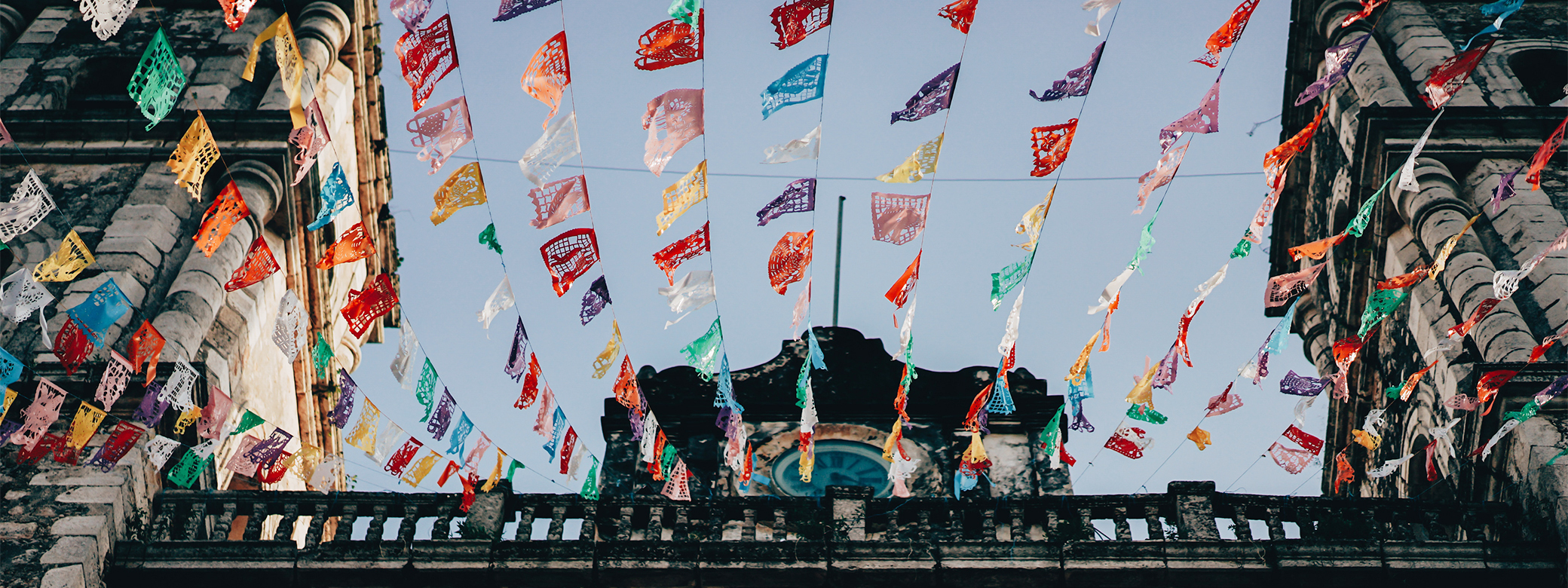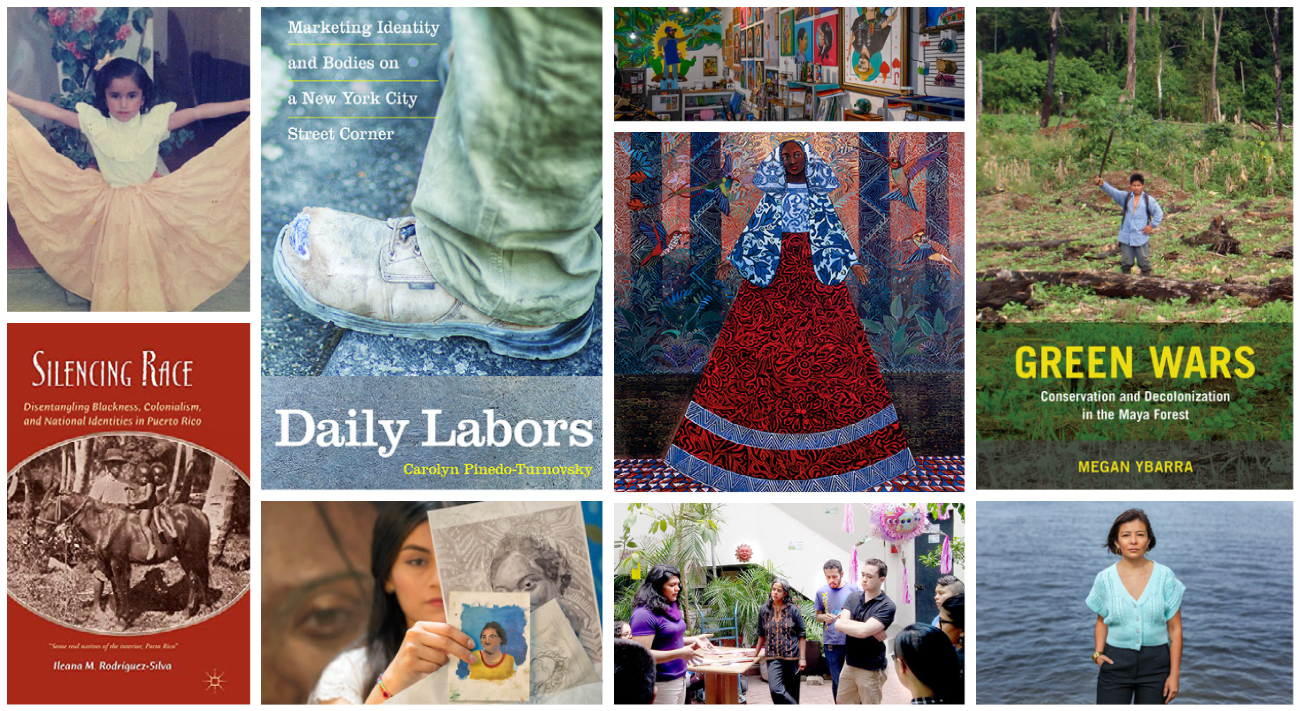
Celebrate National Hispanic Heritage Month this September 15 through October 15 by expanding your understanding of Hispanic and Latinx history and culture through a collection of works by College of Arts & Sciences faculty, students and alumni.
Art and Other Media
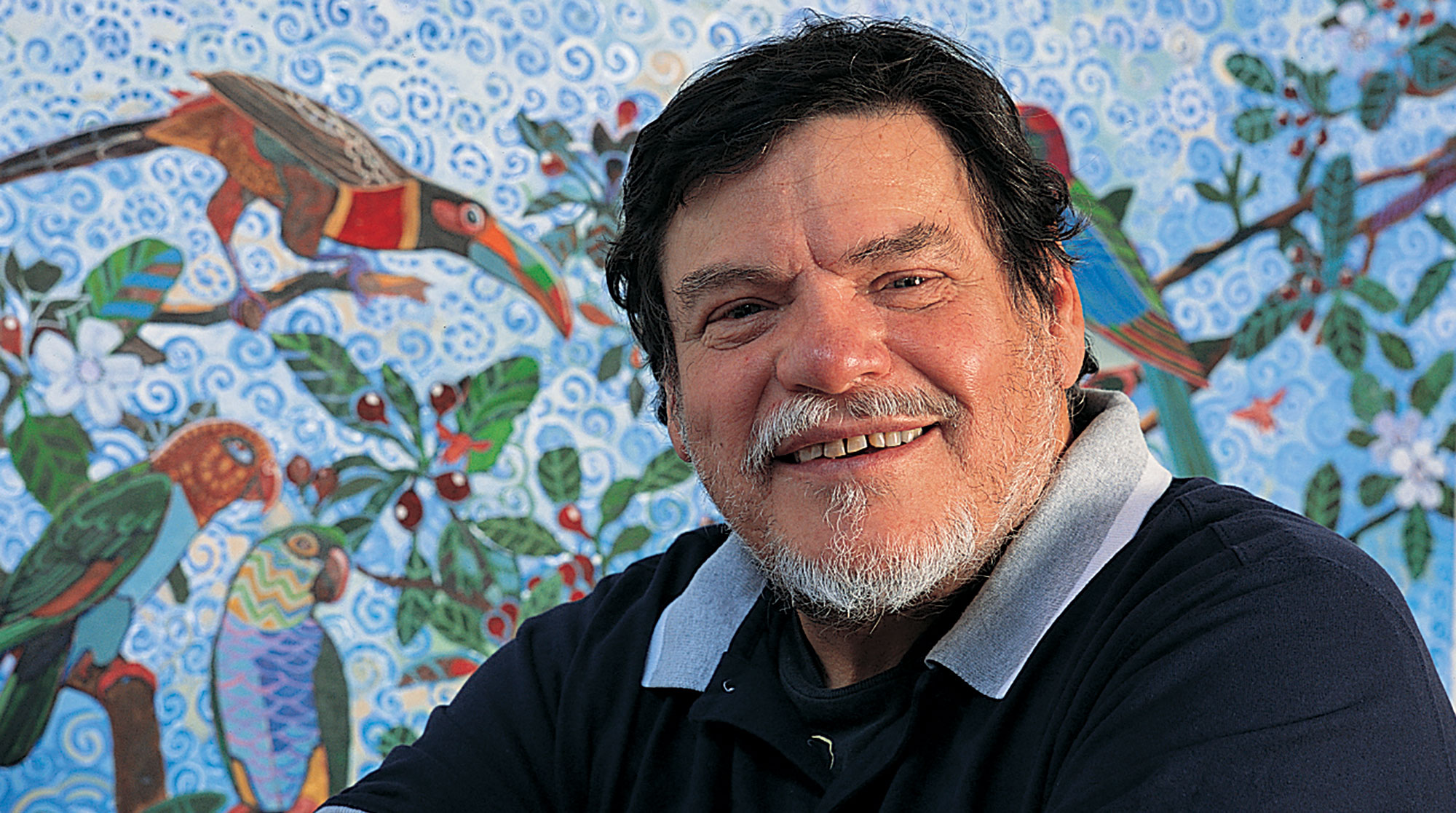
"For Alfredo Arreguin, art blooms from adversity" (UW Magazine)
After childhood abandonment and heartbreak, UW School of Art alumnus Alfredo Arreguin became one of the foremost Mexican-American painters of his generation.
More on Arreguin:
- "Art, friendship, music and nature" (Peninsula Daily News)
"Art that Heals — With Joy" (Arts & Sciences)
Doctoral student Iris Viveros Avendano explores the role of fandango in resistance and healing from collective trauma.
"Bridging Mexico and Seattle: A History of the Seattle Ship Scalers Mural “The Struggle Against Racial Discrimination” by Pablo O’Higgins (1904-1983)" (The Seattle Civil Rights & Labor History Project)
On the UW campus, a hidden treasure hangs in plain sight, on the second floor of Kane Hall. A fresco, "The Struggle Against Racial Discrimination" is one of only two murals painted in the United States by Pablo O’Higgins, a renowned figure in Mexican artist circles in his time. In 1945, Local 541 of the Ship Scalers Union (SSU) commissioned him to paint this work for their Seattle hall, the site of local leftist events as well as their union activities.
The Nepantla Cultural Arts Gallery
Owned and co-directed by American Ethnic Studies alumnus, Jake Prendez, the Nepantla Cultural Arts Gallery is a Latinx/Chicanx arts hub and Cultural Arts Gallery located on the border of West Seattle and the White Center neighborhood that hosts monthly art exhibitions focused on marginalized communities and communities of color.
Prendez is a renowned Chicano artist exhibiting his art and lecturing across the country. His oil paintings and digital artwork are created with a specific focus on themes relating to Chicanx and Indigenous culture, social justice, pop culture, and satire.
"By Radical Means Necessary: Interview with Cristina Ibarra and Alex Rivera" (Film Quarterly)
By Diana Flores Ruíz, Department of Cinema & Media Studies Assistant Professor
Ruíz interviews filmmakers Cristina Ibarra and Alex Rivera about The Infiltrators, a docu-thriller film that tells the story of young immigrants who are arrested by Border Patrol and sent to a for-profit detention center.
"Beyond Aztlán: Mexican and Chicana/o Artists in the Pacific Northwest" at the Museum of Northwest Art (2016)
Curated by Lauro H.Flores, Department of American Ethnic Studies Professor
Spanning the last six decades, this exhibition assembles a diversity of works by Chicana/o and Mexican artists that currently reside or have formerly resided in the Pacific Northwest.
Books and Research
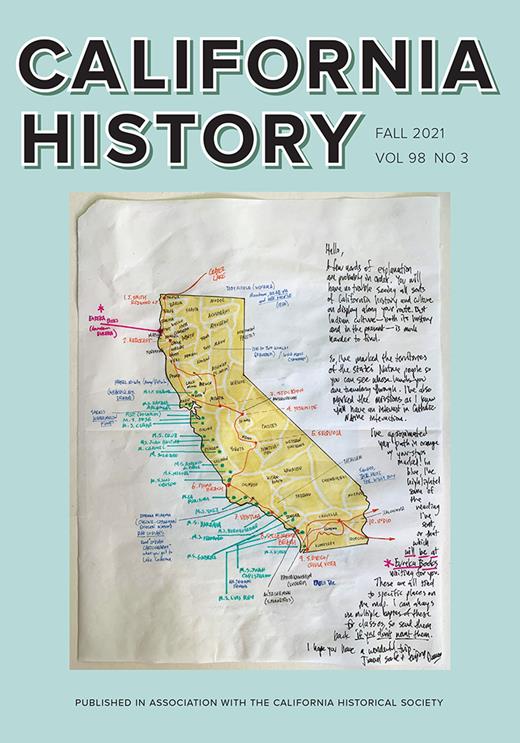
More Than Victims or Villains: Representations of Mexican Migrant Men in the Imperial Valley-Mexicali Borderlands, 1942–1954 (University of California Press, 2021)
By Alina Méndez, Department of American Ethnic Studies Assistant Professor
This essay examines newspaper articles published in California’s Imperial Valley during the mid-twentieth century that reported stories of braceros (guest workers) and undocumented workers suffering accidents, engaging in intra-ethnic violence, falling prey to criminals, and drinking excessively. These news articles, which often cast Mexican migrants as (potentially) criminal, racialized braceros and their undocumented counterparts as outsiders and undeserving... Though scholars have long considered the conditions that I here categorize under structural, everyday, and symbolic violence, I argue that by employing the concept of a continuum of violence we can better account for the wide range of experiences that braceros and undocumented migrants encountered in the United States in the mid-twentieth century.
Green Wars: Conservation and Decolonization in the Maya Forest (University of California Press, 2017)
By Megan Ybarra, Department of Geography Associate Professor
Global conservation efforts are celebrated for saving Guatemala’s Maya Forest. This book reveals that the process of protecting lands has been one of racialized dispossession for the Indigenous peoples who live there. Through careful ethnography and archival research, Megan Ybarra shows how conservation efforts have turned Q’eqchi’ Mayas into immigrants on their own land, and how this is part of a larger national effort to make Indigenous peoples into neoliberal citizens. Even as Q’eqchi’s participate in conservation, Green Wars amplifies their call for material decolonization by recognizing the relationship between Indigenous peoples and the land itself.
More by Ybarra:
- Latinx Geographies (Society + Space, 2019)
Co-edited by Megan Ybarra, Latinx Geographies presents a collection of Latinx geographical work to offer research that rethinks the relationship between Latinx identities and place, and that moves beyond a singular identity politics and toward explaining solidarity across "black, brown and yellow" communities (Pulido, 2006).
Silencing Race: Disentangling Blackness, Colonialism, and National Identities in Puerto Rico (Palgrave Macmillan, 2012)
By Ileana Rodriguez-Silva, Department of History Associate Professor; Department of Geography Adjunct Professor
Silencing Race provides a historical analysis of the construction of silences surrounding issues of racial inequality, violence, and discrimination in Puerto Rico. Examining the ongoing racialization of Puerto Rican workers, it explores the 'class-making' of race.
Daily Labors: Marketing Identity and Bodies on a New York City Street Corner (Temple University Press, 2019)
By Carolyn Pinedo-Turnovsky, Department of American Ethnic Studies Associate Professor
Daily Labors reveals how ideologies about race, gender, nation, and legal status operate on the corner and the vulnerabilities, discrimination, and exploitation workers face in this labor market. Pinedo-Turnovsky shows how workers market themselves to conform to employers’ preconceptions of a "good worker" and how this performance paradoxically leads to a more precarious workplace experience. Ultimately, she sheds light on belonging, community, and what a "good day laborer" for these workers really is.
Land Uprising: Native Story Power and the Insurgent Horizons of Latinx Indigeneity (The University of Arizona Press, 2020)
By Simón Ventura Trujillo, Department of English Alumnus
Land Uprising reframes Indigenous land reclamation as a horizon to decolonize the settler colonial conditions of literary, intellectual, and activist labor. Simón Ventura Trujillo argues that land provides grounding for rethinking the connection between Native storytelling practices and Latinx racialization across overlapping colonial and nation-state forms.
Loca Motion: The Travels of Chicana and Latina Popular Culture (New York University, 2005)
By Michelle Habell-Pallán, Department of Gender, Women & Sexuality Studies Professor; Department of Music and Department of Communication Adjunct Professor
In Loca Motion, Michelle Habell-Pallán argues that performances like Diva L.A. play a vital role in shaping and understanding contemporary transnational social dynamics. Chicano/a and Latino/a popular culture, including spoken word, performance art, comedy, theater, and punk music aesthetics, is central to developing cultural forms and identities that reach across and beyond the Americas, from Mexico City to Vancouver to Berlin. Drawing on the lives and work of a diverse group of artists, Habell-Pallán explores new perspectives that defy both traditional forms of Latino cultural nationalism and the expectations of U.S. culture. The result is a sophisticated rethinking of identity politics and an invaluable lens from which to view the complex dynamics of race, class, gender, and sexuality.
Related work by Habel-Pallán:
- American Sabor: Latinos in U.S. Popular Music, a traveling exhibition with the Smithsonian Institution created by the Experience Music Project with Habel-Pallán and University of Washington scholars
- American Sabor: Latinos and Latinas in U.S. Popular Music (University of Washington Press, 2017)
UW’s 33rd President, Ana Mari Cauce
Raised in Miami after emigrating with her family from Cuba, Cauce joined the University of Washington as faculty in 1986. She is a professor of Psychology and American Ethnic Studies, with secondary appointments in the Department of Gender, Women and Sexuality Studies and the College of Education. She maintains an active research program, focusing on adolescent development, with a special emphasis on at-risk youth. Cauce is also a strong advocate for women and underrepresented minorities to pursue careers in science, technology, engineering and mathematics.
Addressing Issues
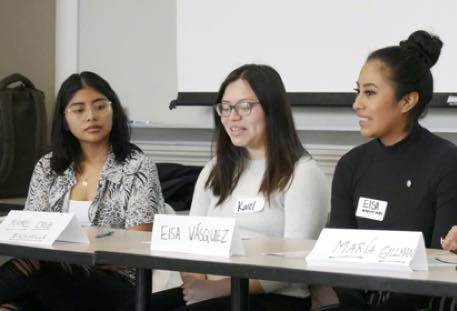
"The Voice of Indigenous and Heritage Speaker Students at the UW" (Spanish & Portuguese Studies)
UW Indigenous students Elsa Vásquez, Karol Janet Cruz Escamilla, and Nancy Mendoza Ruiz participated in a panel discussion in Spring 2020 at the Heritage Language Symposium, hosted by the UW StarTalk Program through the Language Learning Center. The three student panelists shared their experiences as Indigenous people and students within the United States and Mexico.
"Inside the Immigrant Experience" (Arts & Sciences)
Yolanda Valencia (PhD, 2019) explores how undocumented immigrants thrive despite US policies.
"LGBTQ Program Crosses Borders" (Arts & Sciences)
When Anu Taranath led a study abroad program in Mexico this summer, the focus was LGBTQ issues. But the group also discussed migration. And xenophobia.
"MFA painter Arely Morales brings laborers into the limelight" (UW Magazine)
Arely Morales, a UW School of Art fine arts graduate and DACA recipient, takes inspiration from Latino artists and a poet in developing her artistic style.
OPINION: “Hispanic Heritage Month” needs to be rethought.
By José Antonio Lucero, Latin American and Caribbean Studies Chair; Jackson School of International Studies Director and Associate Professor; Department of Comparative History of Ideas Associate Professor; and Department of American Indian Studies Adjunct Associate Professor
"Hispanic Heritage Month" does seem to need some re-thinking. While I understand and endorse the celebration of peoples from across the Americas, like our own families in Mexico and Peru, I share the worry that many have expressed about the label "Hispanic." To put it simply, the focus on Spain and European heritage erases Indigenous and Afro-Latinx Peoples. Just as troubling, the symbols of "Hispanidad" have historical connection with anti-Blackness and dictatorship, most clearly under the Trujillo regime in the Dominican Republic and also in the discourses of ultra-nationalists in the Southern Cone. More recently, some symbols of Hispanidad (like the red and white flag of Borgoña) have been used in Bolivia, Peru, Chile, and across the Americas as part of conservative rejections of Indigenous peoples, progressive politics, and inclusive pluri-national imaginings. "Latinx" has its limitations, but there is something about its intentional inclusivity, its connection to Afro-Latinx communities, Latinx Indigeneities, and other intersectional possibilities that make it feel like a much better term than "Hispanic."
Founded by Department of American Ethnic Studies and Department of Anthropology Professor Devon G. Peña, the Acequia Institute is a non-profit educational and research foundation that promotes agriculture infrastructure innovation, water democracy, environmental justice and working with local youth in educational programs on farming and conservation. Peña conducts applied research for the Institute, which serves indigenous farmers and seed protectors from Haudenosaunee territories in Canada to Mapuche lands in Chile and Ecuador.
For numerous years, Erasmo Gamboa has been an active volunteer with Sea Mar Community Health Centers, a community-based organization committed to providing quality, comprehensive health, human, housing, educational and cultural services to diverse communities, specializing in service to Latinos. Still involved to this day, he currently serves as the Treasurer.
Community and Resources
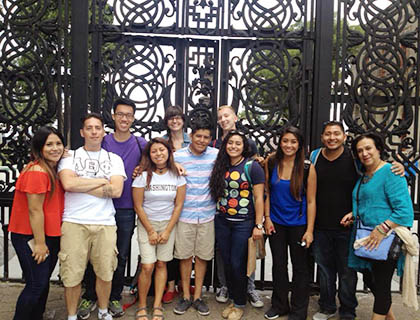
The Center for Spanish Heritage Learning
The UW Center for Heritage Learners provides a safe space in which heritage students can embrace their unique cultural and linguistic abilities by sharing, learning and developing their multilingual and multicultural abilities in a positive way through community-building, self-confidence, academic support services, and employment opportunities.
Samuel E. Kelly Ethnic Cultural Center
The Samuel E. Kelly Ethnic Cultural Center of the University of Washington is part of The Office of Minority Affairs & Diversity. The Kelly ECC has a wealth of resources and opportunities available to students including student advising, organizational development, personal growth, and referrals to different departments and programs.
ASUW Latinx Student Commission
The overarching goals of La Raza Commission are to promote the following: Cultural empowerment, educating others about Latinx/Chicanx culture and histories, educating and providing avenues of discussion about diverse intersecting identities within the Latinx/Chicanx community, promoting higher education to Latinx/Chicanx youth, recognizing and honoring Latinx/Chicanx elders, striving for socio-economic justice; addressing political/social issues within the Latinx/Chicanx community, recognizing and combating gender inequalities.
Latinx Faculty & Staff Association
The University of Washington (UW) Latinx Faculty and Staff Association (LFSA) is an advocacy, leadership development and social network that addresses Latinx issues in higher education, including the educational concerns and advancement of the UW Latinx community.
The University of Washington Center for Human Rights through the Henry M. Jackson School of International Studies is committed to interdisciplinary excellence in the education of undergraduate and graduate students in the field of human rights; promoting human rights as a core area of faculty and graduate research; and engaging productively with local, regional, national, and international organizations and policymakers to advance respect for human rights.
Arts & Sciences Departments and Areas of Study
Departments across the College of Arts & Sciences examine Hispanic and Latinx culture and history, including:
- American Ethnic Studies
- Chicano Studies
- Art History
- Cinema & Media Studies
- Comparative History of Ideas
- Gender, Women & Sexuality Studies
- Geography
- History
- Global and Regional Studies (Jackson School of International Studies)
- Latin American and Caribbean Studies
- Music
- Ethnomusicology
- Spanish & Portuguese Studies
Take a course to further explore themes of Hispanic and Latinx heritage:
- CHSTU 224: Life And Labor In The US-Mexico Borderlands, Alina R Mendez / DIV, I&S / 5 credits
- CHSTU 330: Chicano/Chicana Autobiography, Lauro FLores / I&S / 5 credits
- CHSTU 465: Contemporary Chicana/o Literature, Lauro Flores / VLPA / 5 credits
- GWSS 451: Latina Cultural Production, Michelle Habell-Pallan / VLPA, I&S / 5 credits
- HSTLAC 185: Race, Gender and Class in Latin America and the Caribbean, Ileana M. Rodriguez-Silva / DIV, I&S / 5 credits
- SPAN 362/JEW ST 362: Food and Community: Cultural Practices in the Hispanic World, Ana M. Gomez-Bravo
- JSIS A 325: Modern Mexico: Culture, Politics and Society, Vanessa Freije / I&S/ 5 credits
Is there work that you would like to see in this article? Email us at uwartsci@uw.edu.
More Stories

Finding Love at the UW
They met and fell in love as UW students. Here, 10 alumni couples share how they met, their favorite spots on campus, and what the UW still means to them.

Bringing Music to Life Through Audio Engineering
UW School of Music alum Andrea Roberts, an audio engineer, has worked with recording artists in a wide range of genres — including Beyoncé.

A Love of Classics and Ballroom
Michael Seguin studied Classics at the UW and now owns Baltimore's Mobtown Ballroom. The two interests, he says, are more connected than they might seem.
Explore Stories Across Arts & Sciences Departments
- School of Art + Art History + Design
- School of Music
- Department of Cinema and Media Studies
- Department of Comparative History of Ideas
- Department of Spanish and Portuguese Studies
- Jackson School of International Studies
- Department of American Ethnic Studies
- Department of Gender, Women and Sexuality Studies
- Department of Geography
- Department of History
- See 7 More Tags...
